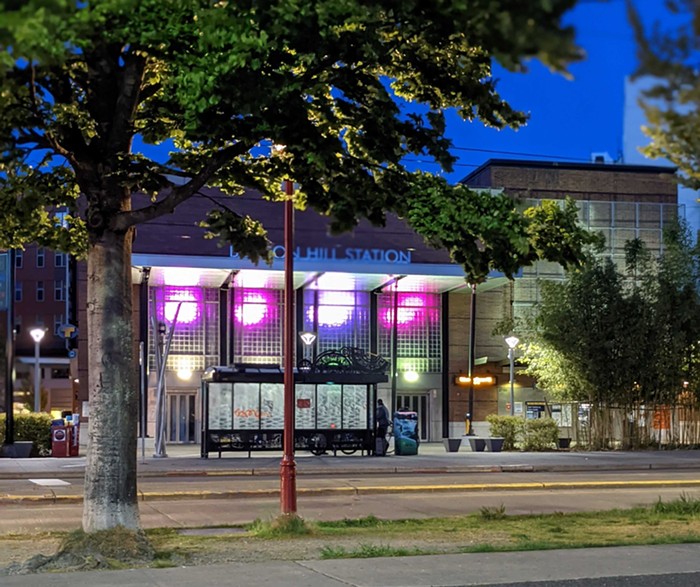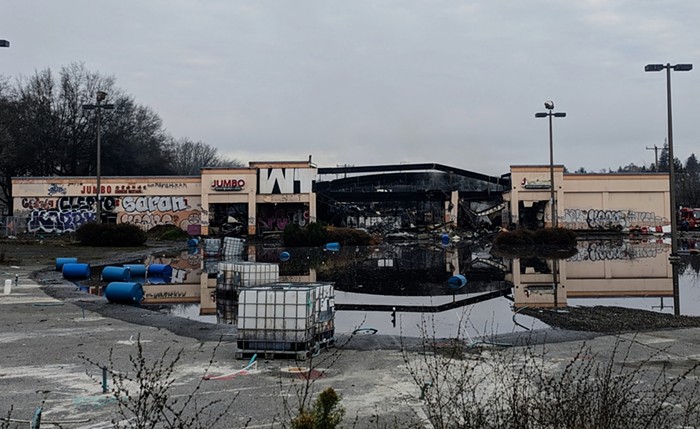
If one is stuck with the tools of standard economics, he/she will not be able to make sense of the fact that during the course of Seattle's construction boom, developers have mostly produced luxury apartments and almost entirely neglected the huge demand for affordable apartments. This fact does not square with the classical "law" of supply and demand. Orthodox economics also lacks the explanatory power to elucidate the current state of Seattle's rental market. Nothing in its books or models can predict the situation we are now in: The prices for luxury apartments falling because of glut that will only grow because more luxury apartments are still under construction; while the cost of affordable apartments remains high or rising because of demand.
From real-estate blog Curbed:
Last month, we reported on analysis from Zillow that showed that rent was starting to slow down, with a slight decrease in median rent in the metropolitan area year-over-year. The catch: That decrease was mostly concentrated in high-end, already-expensive rentals.A quarterly report from Realpage released in late September tells a similar story: high vacancy and slowing prices at the top end, with high demand and high prices at the lower end. While Realpage’s report didn’t show a decrease, the annual change from the third quarter of 2017 to the third quarter of 2018 was just 1.7 percent, but again, largely influenced by what’s happening with newer, higher-end apartments.
There are two useful ways to examine this terrible situation, which makes nonsense of trad economics. One would say: Developers cannot provide affordable housing for reasons related to time and the size of returns. The thing is this: When one transforms their capital into a massive housing development for the working classes, much of that capital must remain frozen for a very long period of time. Capital fixed in luxury developments is far easier to extract because they are more determined by a form of value that can quickly escape the gravity of ordinary supply and demand, and enter that ethereal realm described in Sylvia Plath's poem "The Ghost's Leavetaking." This is where the ghost of a dream goes to upon your awakening. Not "into the rocky gizzard of the earth, but toward a region where our thick atmosphere diminishes, and God knows what is there."
This region ("a point of exclamation [that] marks that sky in ringing orange like a stellar carrot") is also that of Jean Baudrillard's "Transeconomics." He writes: "Money is now the only genuine artificial satellite. A pure artifact, it enjoys a truly astral mobility; and it is instantaneously convertible. [It is] the orbit in which it rises and sets like some artificial sun…" Value as purely value (not use-value) is more likely to rise faster in luxury apartments (through a positive feedback—expensive apartments make land expensive; therefore apartments become more expensive), and therefore recover a huge investment faster.
This is one explanation for the proliferation of luxury apartments in Seattle and other cities. Capitalists in general do not have enough time. This line of thinking leads directly to important chapters in the 2015 book The Entrepreneurial State: debunking public vs. private sector myths by the post-Keynesian US/Italian economist Mariana Mazzucato. The government, according to her thinking, has the waiting time needed to extract returns from long-term fixed capital investments. The market, due its inherent liquidity preference, simply does not. This fact has been obscured by how the media celebrates market innovations and ignores those made possible by the states's inherently secular temporality.
An innovation of this kind is the long-term, low-interest rate mortgage in the US, which was introduced during the Great Depression and became the basis for the massification of the middle class. The free market cannot offer mortgages of this kind without state backing.
But there is another way to examine Seattle's current situation. This is by way of a kind of Marxism that abandons the classical genealogy of political economy (Smith, Ricardo, Marx, the Austrians, Jevons, Marshall, Keynes). The founder of this ultra-heterodox genealogy is the the brilliant Israeli philosopher and cultural theorist Noam Yuran. Though his point of departure is Marx's Capital: A Critique of Political Economy, Volume I, particularly the opening chapters on commodity fetishism and the value theory, he takes a completely surprising direction that reaches Thorstein Veblen’s political economy of conspicuous consumption. This form of economics that also includes Werner Sombart’s Luxury and Capitalism has as its ground Bernard Mandeville’s poem The Fable of the Bees. It's subtitle says it all: “private vices, public benefits."
What this genealogy enables us to see is that the free market cannot produce affordable housing, not only because of the temporal reasons explained by post-Keynesians, but also an ontological one. It's entire state of being is the production and distribution of luxuries. This is why the market can churn out costly RVs but not cheap homes. This is why the poor in high-income societies often repurpose luxuries for their daily needs.
Seattle has been in a building boom for seven years and all it has produced are luxury apartments. This is not an anomaly. This is capitalism to the core. As a whole, it is very hard for the market to provide people with things they actually need: cheap transportation, housing, healthy food. These reveal themselves to be things that only non-market systems and institutions can adequately supply.


















